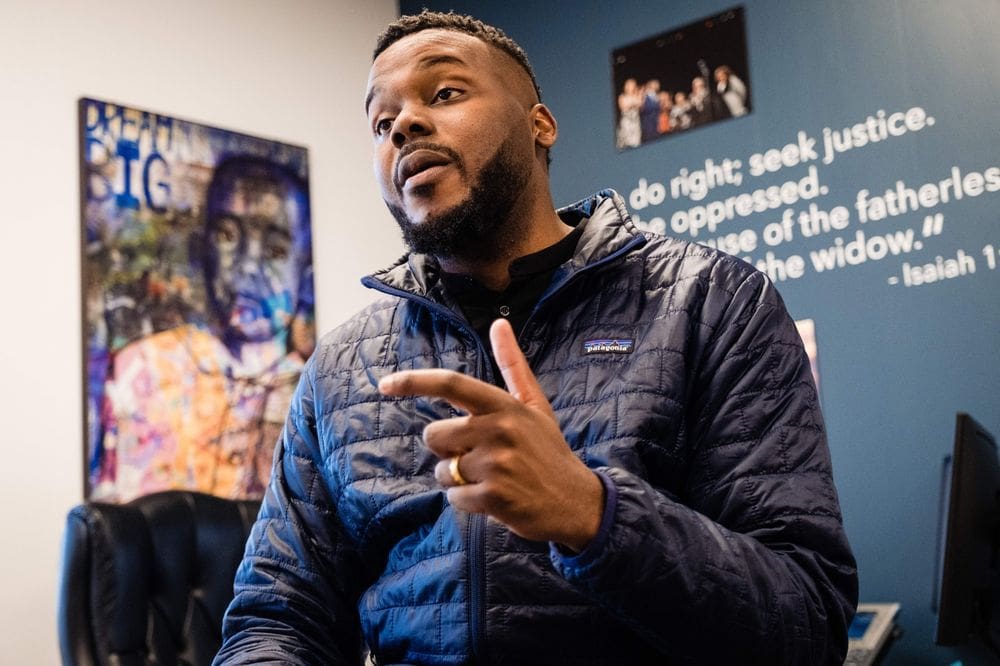A new report on the California’s city’s no-strings-attached money experiment shows that the $500 monthly stipend did more than improve recipients’ well-being: It helped them find work.
By Sarah Holder
In 2019, 125 people in Stockton, California, started receiving $500 a month, no strings attached. The privately funded program, known as the Stockton Economic Empowerment Demonstration (SEED), was designed not only to boost a handful of low-income residents in this struggling city of 300,000 in the Central Valley. It was a rigorous, randomized-control study, meant to evaluate whether, and how, doling out a localized basic income could work, and what happens to those who receive free money.
This week, a report on the first year of the two-year study was released. Some results document the experiment’s physical and emotional effects:
People who received the cash reported less pain, anxiety and fatigue, and spent more time with their kids.
But perhaps the most significant change associated with the program was its effect on their work status:
Among recipients, the rate of full-time employment leaped 12 percentage points over the course of just one year.
“The last year has shown us that far too many people were living on the financial edge, and were pushed over it by Covid-19,” said former Stockton Mayor Michael Tubbs, in a statement. “SEED gave people the dignity to make their own choices, the ability to live up to their potential and improved economic stability going into the turmoil of the pandemic.”
The report released this week was authored by Stacia West, an assistant professor at the University of Tennessee College of Social Work, and Amy Castro Baker, an assistant professor at the University of Pennsylvania in the School of Social Policy and Practice. It draws from data spanning November 2018 through February 2020.
Given that the pandemic had not yet started, this first report chronicles the effects of “one year of guaranteed income when the economy was somewhat normal but not working” for people, said West, in a Clubhouse conversation on Wednesday evening.
A second report, due in 2022, will explore how the program fared in a very different economic environment.
In an interview with Bloomberg Businessweek last year, Martin and Baker both stressed that the point of an experiment like this wasn’t to magically cure the other social problems that create barriers to housing stability or economic mobility. Their goal wasn’t to get more people working nor let more people quit. And though they tracked how recipients spent their money (mostly on food and necessities, and less than 1% on alcohol or tobacco) they didn’t restrict that spending the way other welfare programs do. The main question they wanted to answer, Baker said, was:
“To what degree does guaranteed income serve as a financial vaccine?”
Based on qualitative and quantitative data pulled from a control group and the treatment group, the researchers found that the $500 a month had a profound impact on the people who received it. Unsurprisingly, income volatility, already above the average baseline for many participants in the study, was 1.5 times higher in the control group than the treatment group. The monthly payments allowed people to absorb unplanned economic shocks, like a car repair or an unpaid sick day. Using the Kessler Psychological Distress scale, which measures anxiety and depression, researchers found that the mood of the cash recipients improved more than that of the control group; fatigue and physical pain dropped, too.
Rather than discourage work, the $500 bought the recipients more time to find better work.
People’s feelings of agency and control over their lives also improved.
Participants like Tomas Vargas and Zohna Everett shared stories of finding new employment opportunities and re-opening bank accounts. Lorrine Paradela started sleeping better. In the report, one woman described acquiring a new sense of “chosen vulnerability,” which “included the ability to reduce asking for money or resources from friends and family that people had strained or difficult relationships with, and to limit time in and with relationships they remained in under duress.”
Such findings won’t surprise anyone following basic income experiments in the U.S. or elsewhere.
(In a tweet about the report, West characterized the study results, via a paraphrase from her mentor, as “piercing insights into the obvious.”) Results from a trial in Manitoba designed to address rural poverty in the 1970s took years to be analyzed, but eventually a researcher found that recipients were less likely to be hospitalized, and teens who got the cash were more likely to complete high school. Finland’s short-lived UBI program determined that participants reported a happier life. In 2019, Ontario canceled a three-year trial after only two years but found that doctors’ office visits decreased and social relationships were strengthened. The U.S. ran a series of negative income tax experiments in the late 1960s and early ’70s that were also phased out when political tides shifted.
Still, results on employment effects have tended to be considered inconclusive, or too small to indicate a difference one way or the other. That’s where Stockton’s program breaks new ground: The results show a statistically significant shift in employment prospects for those who participated in the study compared to the control group.
When the experiment started, in February 2019, 28% of recipients reported having full-time employment. By the next year, that percentage had jumped to 40%.
The control group, meanwhile, only saw their employment rates rise 5% over that same period, from 32% to 37%.
Rather than discourage work, as critics of cash programs like it fear, the $500 bought the recipients more time to find better work, West said: time to apply for a new job, to buy a nice suit for the job interview, to find childcare and transportation. And the statistics don’t account for the recipients who have long been doing work that doesn’t get counted as income, like care work in the home — or the people who got the benefit of freedom to quit a job with volatile hours and poor pay. Cities are changing fast. Keep up with the CityLab Daily newsletter.
Matt Zwolinski, the director of the Center for Ethics, Economics and Public Policy at the University of San Diego, sounded a more cautionary note about the results, telling the Associated Press that “Tubbs’ claim that this experiment proves that a basic income doesn’t negatively affect employment is overstated,” because of the limited duration of the study: Knowing that the $500 payments were finite could deter people from exiting the labor market entirely.
Stockton’s experiment ended in January 2021,and so did Tubbs’ time in City Hall — he lost his reelection bid in November.
But the organization he started in 2020, Mayors for a Guaranteed Income, now has 40 mayors on board, half of whom have committed to starting pilots in their communities and to advocating for federal action.
SEED has already been eclipsed in duration and scope by the Magnolia Mothers’ Fund, which is starting its third cycle, giving a new group of Black mothers in Jackson, Mississippi $1,000 a month.
Advocates hope that the other findings that will trickle out of these basic income-piloting cities over the coming months will push the idea further into the national conversation. Tubbs definitely sees a role for it now, as Congress argues over minimum wage and considers a pared-down Covid aid bill that narrows eligibility requirements.
“The data proves that, particularly in a pandemic, it’s not wise policy to make less people eligible for what we know is necessary and needed,” Tubbs said in a press conference.
_____
To see original article please visit: https://www.bloomberg.com/news/articles/2021-03-05/what-did-500-a-month-buy-in-stockton-jobs





















